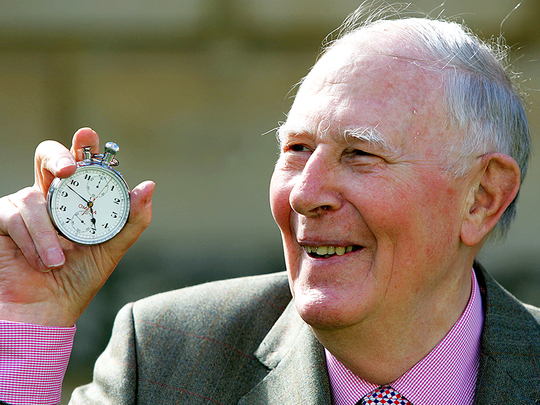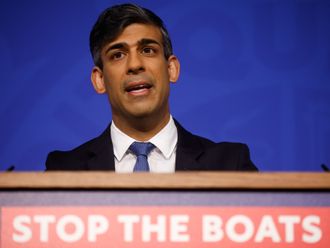
LONDON: The Associated Press interviewed Roger Bannister several times in his later years, including for the 50th and 60th anniversaries of his landmark sub 4-minute mile.
Here are a selection of quotes from those interviews:
On the allure of the 4-minute mile:
“It was a target. University athletes had been trying for years and it just didn’t seem to be capable of being broken. There was a magic about four symmetrical laps of one minute each. It was just something that caught the public’s imagination.”
“Even then people were taking about whether it would ever be possible for someone to run a mile in 4 minutes. … There was no logic in my mind that if you can run a mile in 4 minutes, 1.25, you can’t run it in 3:59. … I knew enough medicine and physiology to know it wasn’t a physical barrier, but I think it had become a psychological barrier.”
On his drive to be the first to break the 4-minute barrier:
“It stood there as something that was waiting to be done, and I was in the right place at the right time and was ready to do it. My attitude was that it can be done, and it will be done soon, and I’d rather it were done here.”
“I thought it would be right for Britain to try to get this. There was a feeling of patriotism. Our new queen had been crowned the year before, Everest had been climbed in 1953. Although I tried in 1953, I broke the British record, but not the 4-minute mile, and so everything was ready in 1954.”
On the bad weather on the day of his attempt and his uncertainty over whether to run:
“I was using a flag on a neighbouring church, a St. George’s flag. I noticed it fluttering and I used that as a measure of the strength of the wind. And I felt that just 20 minutes before, it was not fluttering as strongly. … I calculated there’s a 50-50 chance of my doing it. I said, ‘If there’s a 50-50 chance and I don’t take it, I may never get another chance to beat [John] Landy to it.’ So I said, ‘Let’s do it.’”
On the size of the crowd at Oxford’s Iffley Road track on the day of his run:
“If the number of people who have come up to me saying they were there, they would have fit into Wembley Stadium. Matter of fact, there weren’t more than 1,500. I hadn’t advertised the fact. Word got out that I might break the 4-minute mile, but I didn’t want to be railroaded to being committed to running it if the conditions were absolutely hopeless.”
On the race:
“Chris Brasher was leading. He was a steeplechaser. I settled back. First lap, 58 seconds, and then as one hoped, he took us through the half-mile in 1:58. Then during the lap in which Chris Chataway took over, inevitably he was tiring. Three quarters, I heard was 3 minutes, 1 second. I knew I had to do the last lap in 59. At 300 meters, I overtook him. I then went flat out for the finishing line and just about managed to stagger over it, all in. I couldn’t stand at the end. I had always been able to take more out of myself than there was in the final sprint and I did on that occasion.”
On the announcement of his time by Norris McWhirter:
“He had carefully rehearsed. He announced: ‘The result of event No. 8, 1 mile, was R.G. Bannister, of Merton and Exeter Colleges, in a time which subject to ratification, is a new track record, a new British all-comers record, a new European record, a new Commonwealth Empire record, a new world record in 3….’ That was when the crowd exploded and we didn’t hear any more. It didn’t matter what the rest was.”
On his showdown against John Landy at the Empire Games in Vancouver, British Columbia:
“I knew that more important than the 4-minute mile, from the point of view of my career, was whether I could or could not defeat John Landy. The Empire Games in Vancouver were the important settling of the score. If I didn’t manage to defeat John Landy there, he would be the world record holder and have the right to be the best miler in the world.”
“He went into the lead. The first half-mile was just on 2 minutes. At three-quarters he seemed to be getting away from me and there was a gap of about 12 yards at one point. But I managed to close the gap during the third lap, and then on the last bend he looked over his left shoulder and I chose that moment to overtake him and we managed to finish in that order: Bannister 1 and Landy 2, by about four yards.”












